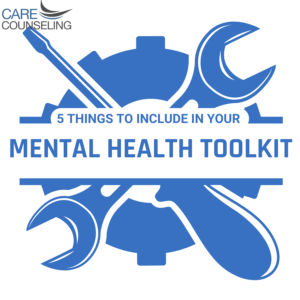5 Things to Include in Your Mental Health Toolkit
 Most people have at least a few helpful tools readily accessible when needed. Screwdrivers, a hammer, and a tape measure are traditional tools I like to have at arms-length. When it comes to mental health tools, I recommend having at least three effective coping tools that are the most useful for you. If there are any safety concerns, it is also important to have a plan for safety readily accessible to include names and numbers of people you can contact. Having more tools in your toolbox is a great way to be better equipped for whatever challenges you may face. Situations will be different, as will the strategies that are most effective. Tools for coping with loneliness are likely going to differ from those needed to cope with panic or anger so it is important to have a well-stocked toolbox.
Most people have at least a few helpful tools readily accessible when needed. Screwdrivers, a hammer, and a tape measure are traditional tools I like to have at arms-length. When it comes to mental health tools, I recommend having at least three effective coping tools that are the most useful for you. If there are any safety concerns, it is also important to have a plan for safety readily accessible to include names and numbers of people you can contact. Having more tools in your toolbox is a great way to be better equipped for whatever challenges you may face. Situations will be different, as will the strategies that are most effective. Tools for coping with loneliness are likely going to differ from those needed to cope with panic or anger so it is important to have a well-stocked toolbox.
For folks with more severe and persistent mental health problems, having a fully stocked toolbox is going to be considered essential. Individuals who have been diagnosed with the following mental health or medical conditions are likely going to need a treatment team for support, in addition to a wide variety of tools to access. This includes but is not limited to those experiencing:
- Schizophrenia/ Psychosis
- Mood Disorders (including Bipolar Disorder and Severe Depressive Episodes)
- Neurodevelopmental Disorders (Learning Disorders, ADHD, Autism)
- Complex Trauma/ Borderline Personality Disorder
- Chronic Medical Conditions (e.g., arthritis, chronic pain, heart issues, diabetes)
These five questions will help determine which tools are going to be most helpful.
- What are the primary concerns/ symptoms you are struggling with?
- Are there any immediate safety concerns?
- Have there been any significant changes in symptoms of the mental health or medical condition?
- Are you taking any medications, as prescribed? Is there any use of mind-altering substances?
- Have you talked to your therapist and/ or therapist?
Therapy is a great place to learn different strategies to help with symptom management. This can include therapeutic approaches such as cognitive behavioral therapy to work with thoughts, feelings, and behaviors. Social and peer/ group support are especially helpful as well as connecting to community resources. Coordination of care is also recommended so that all involved supports such as therapists, doctors, psychiatrists, and case managers can work together. The 988 suicide and crisis lifeline are available 24/7. https://988lifeline.org/
Some people may need to use tools for the rest of their life to manage their mental health, and that is OK!
There is no shame in using your tools and support is available to help empower you to utilize the tools you need.
Written By: Charlotte Johnson, MA, LPCC



























